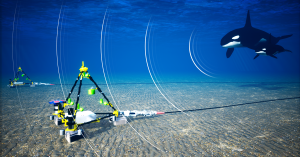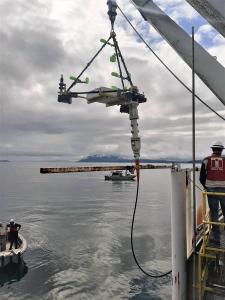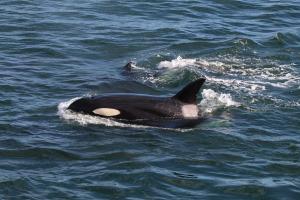This underwater observatory tracks endangered killer whales and measures noise impacts from shipping vessels

The Underwater Listening Station detects and tracks calling marine mammals beneath the shipping lanes on the B.C. coast. It is hoped the results will feed alert systems to notify approaching vessels when animals are present and in their path.
JASCO deploys underwater listening station in the Salish Sea to protect endangered whales and quiet ships, commissioned by Transport Canada
Commissioned by Transport Canada under the federal government’s five-year Whales Initiative, this $9.5-million listening station project aims to support the protection and recovery of endangered Southern Resident killer whales and to provide data to accurately evaluate noise-reduction technologies applied to ships. JASCO is operating the system and working with the Vancouver Fraser Port Authority-led Enhancing Cetacean Habitat and Observation (ECHO) Program to analyze and distribute the results.
The Boundary Pass location was chosen because it is within critical habitat of the Southern Resident killer whales—a dwindled population of only 74 individuals at present—and is also a major thoroughfare for commercial vessel traffic. Positioned between the inbound and outbound shipping lanes, the observation frames use pyramid-shaped arrays of hydrophones to detect and triangulate the positions of calling marine mammals and ships transiting overhead. This ability allows counting of the individual calling animals within pods of whales passing the listening station.
JASCO’s OceanObserver intelligent monitoring systems are the brains of the listening station. The devices are designed for acquiring and processing large volumes of acoustic data in real time on devices such as ocean gliders, buoys, and cabled observatories like the listening station. The OceanObservers are connected by 2.8 kilometres of subsea fibre-optic cables to a shore station on Saturna Island, transmitting over 1 terabyte of data to shore each day. The sound recordings, together with underwater video and oceanographic sensor data, are reported online in real time.
> TRACKING ENDANGERED SOUTHERN RESIDENT KILLER WHALES
The whale detection results include the species, locations, and travelling directions of the animals. These will help reveal the distribution and activity of animals in this area, including Southern Resident killer whales. In the future it is hoped these results will feed alert systems to notify approaching vessels when animals are present and in their path.
The Boundary Pass station follows in the footsteps of an underwater listening station deployed in the Strait of Georgia by JASCO and Ocean Networks Canada, a demonstration project that operated successfully from 2015 to 2018 also under the ECHO Program.
Between temporary recorders deployed since December 2018 and the cabled listening station that replaced them in June 2020, and with the support and participation of the BC Coast Pilots, the shipping industry and regional commercial vessel operators, the project has already obtained high-quality measurements of underwater noise emissions of over 10,000 ships.
David Hannay, JASCO’s chief science officer, says this system has produced the largest ship noise database in the world and it continues to grow by 15 to 20 new measurements each day. These data are extremely important, he says, for understanding underwater noise emissions and supporting the development of “quiet ship” limits—a process involving international ship certification societies and spearheaded by the ECHO Program and Transport Canada. The goal is to reduce ship noise globally, benefitting Southern Resident killer whales and all species of the world’s oceans.
JASCO is also working with the ECHO Program to use the vessel noise signatures to investigate the relationships between vessel noise emissions and operational and design parameters, to provide information relevant for ship owners to operate their vessels as quietly as possible. This long-term monitoring project will also document trends in underwater noise over many years, providing valuable feedback to Transport Canada on the effectiveness of measures aimed at reducing ship noise in Southern Resident killer whale critical habitat.
Continuing to partner with Transport Canada and the ECHO Program, JASCO will operate the station and continue to deliver results until at least March 2023.
For more information, see our Media Kit on our press page: http://www.jasco.com/press
David Hannay
JASCO Applied Sciences
+1 250-514-6016
david.hannay@jasco.com
Visit us on social media:
Facebook
Twitter
LinkedIn
Time lapse of one of the listening frames being deployed in Boundary Pass in May 2020
Legal Disclaimer:
EIN Presswire provides this news content "as is" without warranty of any kind. We do not accept any responsibility or liability for the accuracy, content, images, videos, licenses, completeness, legality, or reliability of the information contained in this article. If you have any complaints or copyright issues related to this article, kindly contact the author above.


